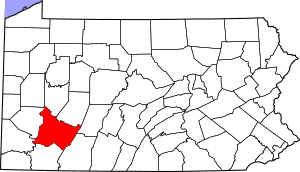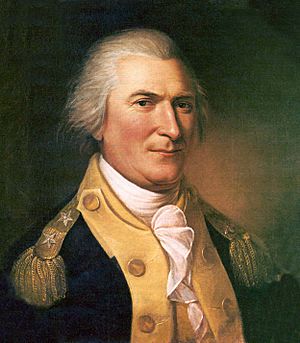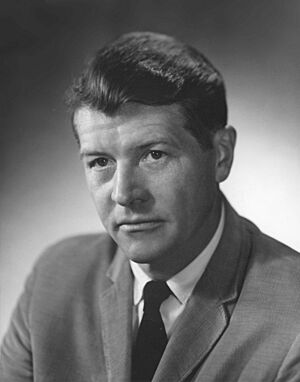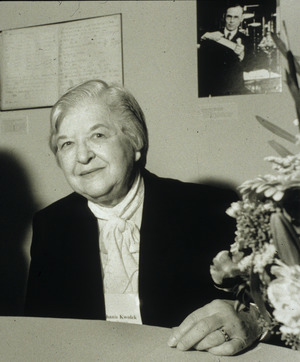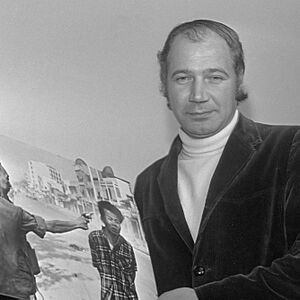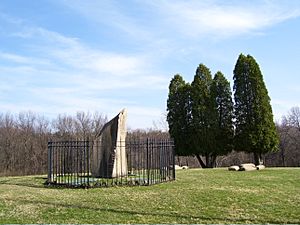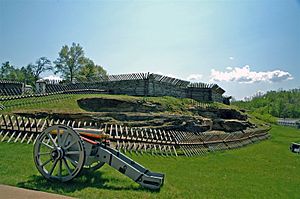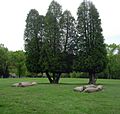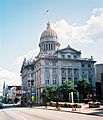List of Pennsylvania state historical markers in Westmoreland County facts for kids
Westmoreland County in Pennsylvania is home to many important historical markers. These markers are like special signs placed by the Pennsylvania Historical and Museum Commission (PHMC). They help us remember important people, places, and events that happened in the county. There are 45 of these markers across Westmoreland County, each telling a unique story about its past.
| Top - 0-9 A B C D E F G H I J K L M N O P Q R S T U V W X Y Z |
Famous People and Their Stories
Westmoreland County has been home to many notable individuals. Historical markers celebrate their lives and achievements.
Arthur St. Clair: A Revolutionary Leader
Arthur St. Clair (1737-1818) was a very important person during the American Revolution. He was a general in the Continental Army. Later, he became the first governor of the Northwest Territory. This was a huge area of land that is now part of the Midwest United States. Markers for him can be found near Ligonier and in Greensburg. They remind us of his role in shaping early American government and military efforts.
Fred McFeely Rogers: Mister Rogers' Neighborhood
Most people know Fred McFeely Rogers (1928-2003) as "Mister Rogers." He was a beloved television personality. His show, Mister Rogers' Neighborhood, taught children about kindness and understanding. A marker for him is in Latrobe, his hometown. It celebrates his lasting impact on popular culture and education.
Christian B. Anfinsen: A Nobel Prize Winner
Christian B. Anfinsen (1916-1995) was a brilliant scientist. He won the Nobel Prize in Chemistry in 1972. His work helped us understand how proteins are structured. This knowledge is very important in medicine and science. His marker is in Monessen, honoring his contributions to scientific discovery.
Stephanie Kwolek: Inventor of Kevlar
Stephanie Kwolek (1923-2014) was an amazing chemist. She invented Kevlar, a super strong material. Kevlar is used in many things, like bulletproof vests and strong cables. Her invention has saved countless lives. A marker in New Kensington celebrates her groundbreaking work.
Eddie Adams: A Famous Photographer
Eddie Adams (1933-2004) was a famous photographer. He won a Pulitzer Prize for his powerful images. His photos often captured important moments in history. A marker in New Kensington honors his career in journalism and photography.
Historical Events and Places
Westmoreland County has been the site of many significant historical events. These markers help us remember these moments.
The Banana Split: A Sweet Invention
Did you know the banana split was invented in Latrobe? A marker at 805 Ligonier Street celebrates this sweet treat. It was created in 1904 by David Strickler. He was a 23-year-old pharmacist. This marker reminds us of the county's role in creating popular American foods.
Bushy Run Battlefield: A Key Battle
The Battle of Bushy Run was a very important battle. It happened in 1763 during Pontiac's War. This war involved Native American tribes and British forces. The battle took place near present-day Harrison City. Markers here tell the story of this conflict. They highlight its importance in the history of early American settlement and Native American relations.
Fort Ligonier: A Frontier Stronghold
Fort Ligonier was a key British fort during the French and Indian War (1754-1763). It was built in 1758. The fort helped protect British forces as they moved west. A marker in Ligonier tells about its role in this major conflict. It also highlights the interactions between European settlers and Native Americans.
Forbes Road: A Historic Path
The Forbes Road was a military road built in 1758. It stretched from eastern Pennsylvania to Fort Duquesne (now Pittsburgh). This road was crucial during the French and Indian War. It allowed British troops to move supplies and soldiers. Several markers in Westmoreland County, including near Murrysville and Ligonier, mark its path. They remind us of its importance for transportation and military strategy.
Darr Mine Disaster: Remembering Coal Mining History
The Darr Mine Disaster happened in 1907. It was a tragic event in the history of coal mining in Pennsylvania. Many miners lost their lives. A marker near Smithton remembers this event. It highlights the dangers faced by coal miners and the importance of labor history in the region.
Murrysville Gas Well: Early Energy Discovery
The Murrysville Gas Well was drilled in 1878. It was one of the earliest and largest natural gas wells in the United States. This discovery helped kickstart the natural gas industry in Pennsylvania. A marker in Murrysville tells about this important moment in energy history.
Other Notable Markers
Westmoreland County has many other markers that tell interesting stories.
Idlewild Park: A Place for Fun
Idlewild Park is one of the oldest amusement parks in the United States. It opened in 1878. A marker near Ligonier Township celebrates this historic park. It reminds us of the importance of recreation and entertainment in the county's history.
Rural Free Delivery: Mail to Your Door
The Rural Free Delivery (RFD) service began in the late 1800s. It allowed mail to be delivered directly to people's homes in rural areas. Before this, people had to travel to the post office. A marker in New Stanton commemorates this important service. It changed how people in the countryside received their mail and goods.
Images for kids
See also
- List of Pennsylvania state historical markers
- National Register of Historic Places listings in Westmoreland County, Pennsylvania


